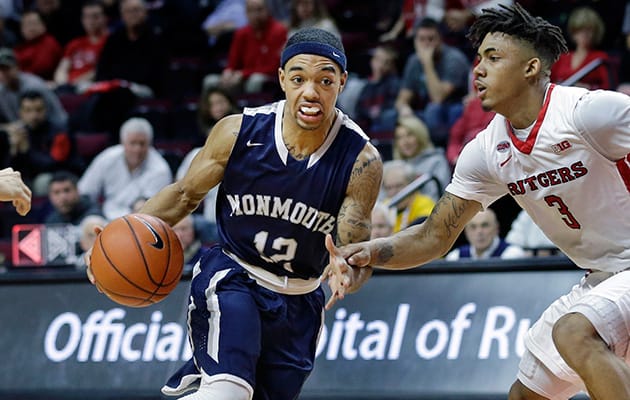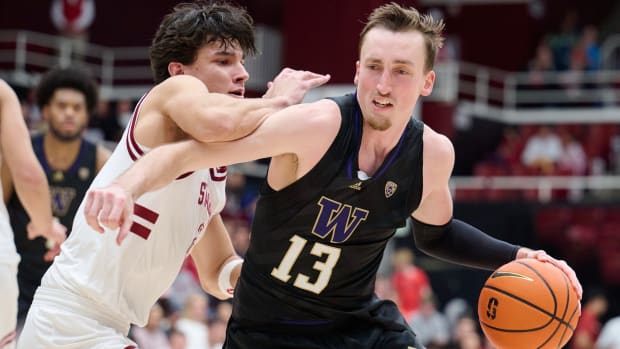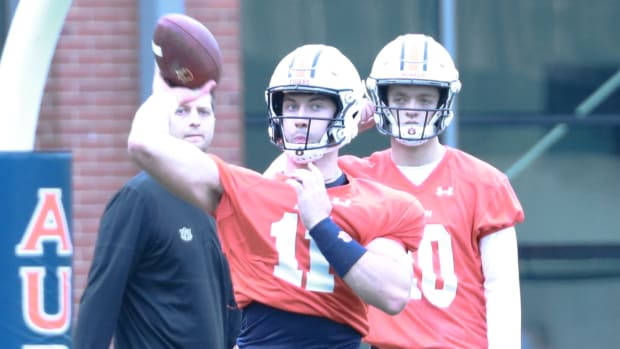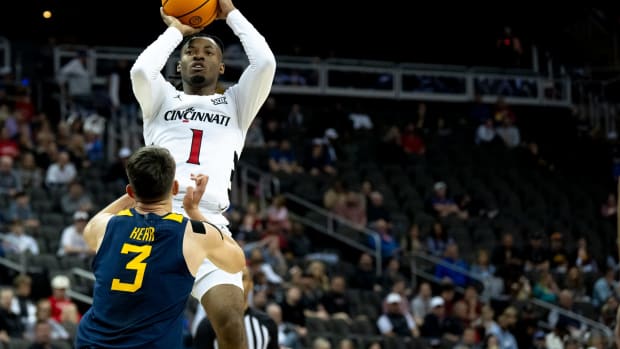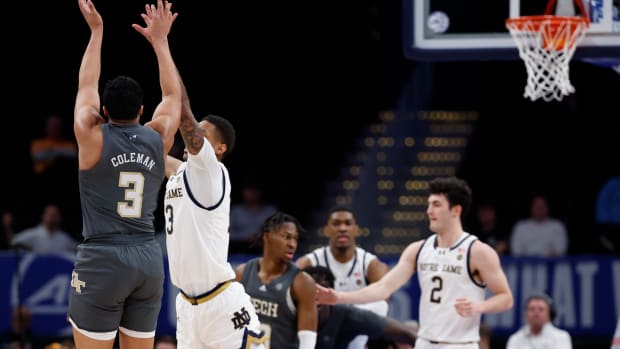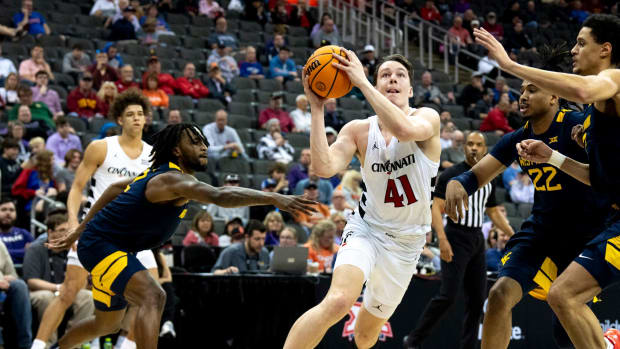Mail: NCAA tournament sleepers, legacies of two Big Ten guards
As we head into the final week of the regular season, our last Twitterbag begins with a pair of queries regarding the careers players at two of the Big Ten’s marquee programs:
How come no love nationally for Yogi Ferrell? First [Indiana] player to win multiple Big Ten titles in [his] career since [the] early 90s? — Aaron Watson (@DocWatson16)
It’s not exactly breaking news that Ferrell is a great player, but I agree there has not been enough attention paid to the historic nature of his career. So let me pay it.
For starters, Ferrell broke Indiana’s career record for assists back in January. They have been playing high-level basketball at Indiana for quite some time, so setting any career mark takes some doing. When Ferrell had five assists in Indiana’s win at Iowa Tuesday night, that pushed his career total to 603, making him just the sixth player in Big Ten history to surpass 600. His 132 career starts is also the most in school history. He has now led Indiana to two outright Big Ten titles within four seasons for the first time since 1983.
Ferrell isn’t just a setup man, either. He ranks seventh on the school’s alltime scoring list, he’s second in career made three-pointers, and his 68 consecutive game streak with at least one three-pointer—which ended in November—is by far the most in school history. (A.J. Guyton’s 39 straight is second.) Among the other players on Indiana’s top 10 scoring list, only two—Don Schlundt (1951–55) and Kent Benson (1973–77)—also won multiple Big Ten titles.
There has been much discussion about where Ferrell belongs in various player of the year and All-America discussions. But as his final season winds down, let’s be sure to acknowledge the historic levels of excellence he has achieved at this storied program. He has earned our love.
The SI Extra Newsletter Get the best of Sports Illustrated delivered right to your inbox
Subscribe
What should Caris LeVert’s legacy be at Michigan? — Greg Waddell (@gwizzy12)
This is a tough one, because LeVert should have been one of the great stories, not to mention one of the great players, in recent Michigan basketball history. Remember, he originally committed to Ohio University, but he re-opened his commitment in the spring of 2012 when that school’s coach, John Groce, left for Illinois. Even at that point, LeVert was not highly recruited, but John Beilein had a scholarship available and thought LeVert was worth the chance.
Michigan G Caris LeVert out for season with leg injury
LeVert was a bit player as a freshman on Michigan’s national runner-up squad in 2013. He failed to score a point in nine of the team’s final 10 games—including the championship loss to Louisville, during which LeVert played 12 minutes off the bench and attempted just one shot. However, when the roster emptied, LeVert took advantage of the opportunity and made a huge improvement his sophomore season. He eventually became one of the best players in the Big Ten, which is a testament to his character, his work ethic, and not least of all his physical talent. And he’s about the nicest young man you’d ever meet.
Alas, when it comes to LeVert’s legacy, we will eventually fall on how that promise went unfulfilled because of injuries. His junior season ended on Jan. 17, when he fractured his foot in the final minutes of a win over Northwestern. LeVert could have entered the NBA draft, but he decided to return for his senior year. This time, he didn’t even make it to January before getting injured again. (The ultra-secretive Beilein has only revealed that LeVert suffered a “left leg injury.”) LeVert tried to come back two weeks ago against Purdue, but he suffered another setback, and this week he decided to end his season.
Hopefully, LeVert will recover and go on to a successful professional career. It is a shame that he missed the opportunity to develop his game even further in college, because the trajectory he was on could have landed him on a lot of All-America lists. It’s hard for a player to leave much of a legacy when he has spent most of his final two seasons on the bench. LeVert is a talented player and a wonderful young man, but when Michigan fans think back on his career, they’ll mostly sigh and mutter about what could’ve been.
Deep sleeper [NCAA tournament team] other than Valparaiso? — Isaac Hester (@sweetness482004)
You mean I can’t name Valparaiso five times? Here’s a summary of somnambulant suspects:
1.Stephen F. Austin. The Lumberjacks have been to the last two NCAA tournaments, they are undefeated in the Southland, they own the nation’s longest win streak at 16, and they are led once again by 6’4” senior guard Thomas Walkup, who ranks in the top six of the conference in points (16.8), assists (4.5), rebounds (6.9) and field goal percentage (.580).
Which mid-majors could crash the NCAA tournament with at-large bids?
2.Saint Mary’s. The Gaels are incredibly efficient on offense (they lead the nation in field goal percentage and assist-to-turnover ratio), and they actually play some defense, too (first in the WCC in points allowed with 60.3, and they’re second in field goal defense).
3.Monmouth. Yeah, you know about the bench, but the important thing is that the Hawks won the MAAC regular season title outright. And junior guard Justin Robinson, the diminutive dynamo, is as fun to watch as any player in the country.
4.Little Rock. The Trojans have the fewest losses (they’re 27–3) of any team in Division I. They also scored early season road wins over San Diego State, Tulsa and DePaul.
5.Hawaii. The Warriors have led the Big West wire to wire this season, and they darn near knocked off Oklahoma at home in late December before losing by three.
One college coach to draw up the last-second out-of-bounds play with you and your friends on the floor. [Who] do you want? — Danny McNamara (@FriartownMayor)
Lists, lists, I love lists ...
1.Tim Floyd, UTEP. Best out-of-bounds-drawer-upper I’ve ever seen. He’s also great at mucking up a game with junk defenses.
2.Larry Brown, SMU. I love the way NBA coaches think about the game. Their plays just look smarter than the ones drawn up by guys who never played or coached professionally.
3.Mike Krzyzewski, Duke. The guy has won five NCAA titles. I’m pretty sure he can draw up an out-of-bounds play.
4.Rick Pitino, Louisville. I’ve always thought he was underrated as a pure Xs-and-Os coach.
5.Shaka Smart, Texas. He spends a lot of time and energy thinking of things that nobody is doing yet, and then doing them.
What can we do to get the [regular] season conference [champions] the auto-bid instead of [conference tournament] winners? — Adam (@41Mott)
This decision is made by individual conferences, not the NCAA. No rule prevents the ACC or Sun Belt or SWAC from awarding its regular season champion the league’s auto-bid. The Ivy League doesn’t even have a conference tournament, so it always sends its regular season champ.
The argument in favor of this is usually twofold: First, it puts a greater emphasis on the more difficult achievement, which is winning the regular season title (as opposed to just getting hot for a few days). Second, if a league is trying to prove it can hang with the big boys, why wouldn’t it want to send its best team?
• MORE: Picking year-end award winners in six major conferences
I’m sure it comes as no surprise that these factors are overridden by the desire for the exposure and revenue generated by having the conference tournament on national television. If there were not an NCAA bid at stake in the conference tournament, then it would become a far less attractive piece of inventory. Moreover, it would diminish the excitement for the teams and fans who gather to build bonds, celebrate their league and play some highly competitive basketball.
Generally speaking, I like when leagues reward their conference tourney champs with the bid. Some of the most exciting games you’ll see all year are those tournament finals. However, I also prefer, especially at the mid-major level, a conference tournament that rewards regular season performance by having the higher-seeded teams either host the opening rounds, or the entire tournament. That is a good way to split the baby.
Could Syracuse make a run in the tournament due to playing zone, which a lot of teams never see? — Chris McKay (@Shootersshoot3)
Since Jim Boeheim returned from his suspension in early January and righted the Good Ship Orange, ‘Cuse (19–11, 9–8 ACC) has been neither good enough nor bad enough to warrant much chatter. The team took care of business and won enough games (the two-point win at Duke was the big one), so that it can withstand its recent slide of losing three in four, especially considering those losses came against other tournament teams.
The team’s most glaring deficiency has been obvious from the start: It has no depth. It currently ranks next to last in the entire country in percentage of minutes played by the bench, according to kenpom.com. People harp on lack of depth as a concern for fatigue, but that is not the problem so much as the inability to withstand foul trouble. Having no bench also handcuffs a coach’s ability to make adjustments to take advantage of various matchups. So if ‘Cuse has an off shooting night, it really has no Plan B.
As for the zone, well, it’s true that nobody plays it more often or as well, and if a team hasn’t seen much zone during the season then it will have a hard time figuring out Syracuse’s. However, a zone is only as good as the fellas who play in it. The reality is that this team lacks the rim protector it has had in past years, which gives the rest of the defenders the ability to pressure opposing three-point shooters. The word has been out from Day 1 that Syracuse is weak at defending the post.
Finally, I’m not sure the zone is the advantage it used to be because so many more teams played zone this season as a result of the tighter defensive rules. So teams have had a lot more practice with their zone offense than in years past. In other words, while Syracuse is going to be in the tournament, I don’t expect it will be there past the first weekend—zone or no zone.
Mid-major coach who should/will be mentioned for the next Power Five openings? — The Grand Poobah (@postcard4273)
One more list! One more list!
1.Gregg Marshall, Wichita State. He turned down Alabama last year and re-upped for more than $3 million per season. So he’s expensive, but given that his senior backcourt tandem of Fred VanVleet and Ron Baker is moving on, Marshall may think it’s time for him to leave as well.
2.Archie Miller, Dayton. Dayton barely meets the definition of a mid-major program, but it is definitely not in a Power Five conference. Despite the Flyers’ recent slide, Miller will remain a hot property this spring.
3.Bryce Drew, Valparaiso. He has the Crusaders poised for their third NCAA tournament bid during his five years at the school. And he has some big-time bloodlines, too.
4.Brad Underwood, Stephen F. Austin. He has flirted with schools like Marshall and Southern Miss in the past, but everyone in the sport knows Underwood is ready for a bigger leap, a la Mike White going from Louisiana Tech to Florida. The only question is whether a Power Five AD is ready to take a chance on someone who has only been a head coach for three seasons.
5.Randy Bennett, Saint Mary’s. Bennett has toiled for quite some time under the shadow of Mark Few and Gonzaga, but this season his program got the better of his WCC rival. In the last eight years, Saint Mary’s has been to the NCAA and NIT tournaments four times each. That type of sustained excellence will be rewarded eventually.
